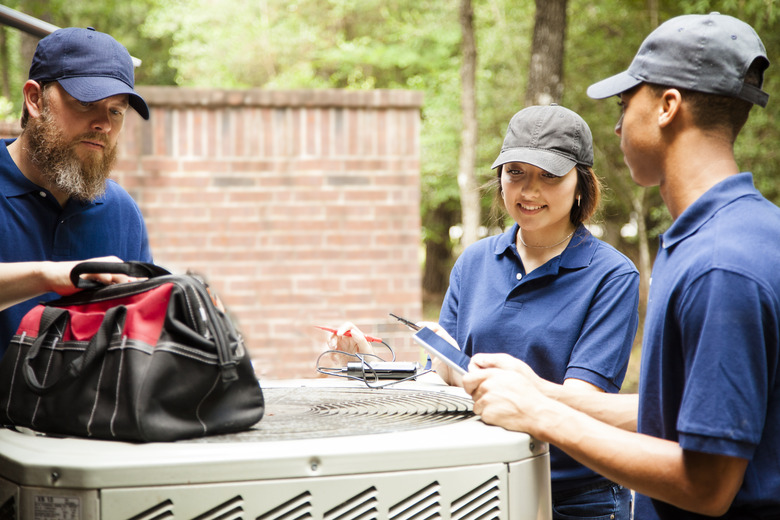How Much Freon Will A Central Air System Lose Over Time?
We may receive a commission on purchases made from links.
Central air conditioning systems utilize a variety of refrigerants, most of which are generically called "Freon." A central air unit is a sealed system, not to be serviced by the homeowner, and shouldn't leak refrigerant during its lifetime. Unfortunately for the environment and the expense of the homeowners, A/C units can develop a small leak at some point. The lost refrigerant can be replaced, but the unit will also need repairs to prevent future leaks.
Tip
When a central air unit is functioning properly, it doesn't lose or break down Freon. If your unit is low on refrigerant, it means you have a leak in the unit that needs to be repaired immediately to prevent more damage.
What Is Freon?
What Is Freon?
Freon is the brand name of a coolant developed by DuPont in the 1920s as a safe alternative to noxious chemicals used in refrigerator units. As the development of air conditioning evolved, Freon became the industry standard. The product, simply referred to as "R-22," was removed from the market in 1987 due to a phase-out of ozone-depleting chlorofluorocarbons. DuPont manufactures R-410A, which is still generically referred to as "Freon" but is actually branded as "Suva."
Freon Leaks in Air Conditioners
Freon Leaks in Air Conditioners
Freon, contained in a closed loop inside the A/C system, is already inside a new unit when you have it installed. With no vents and no means to evaporate outside its confines, the chemical should last the lifetime of the unit. Portable and window air conditioners also use refrigerant and shouldn't lose it over time.
However, leaks in A/C systems are fairly common and typically occur at a pressure point and in locations that leave the piping vulnerable. Leaks can happen for a variety of reasons, including corrosion to the pipes, weak joints, installation mistakes, regular wear and tear, and defects from the factory.
If a leak is suspected, the first place to look is the compressor unit located outside the home. This unit, which is usually a large round device with a fan, can be easily damaged by children, animals and lawn mowers. Repairs to this unit can be costly.
A/C Leak Detection
A/C Leak Detection
A refrigerant leak isn't always obvious, but you might notice that your central air can't keep up with the cooling demands. The refrigerant is necessary for proper cooling, so when it leaks long enough, the unit's refrigerant level gets so low that it won't cool. Other signs of a leak include a hissing sound, reduced airflow, higher utility bills, frozen evaporator coils, or high humidity levels.
If you suspect a refrigerant leak, contact an HVAC technician immediately. An A/C professional uses an electronic sniffing device that can pinpoint a leak and help determine the proper course of action. Minor leaks are not repaired, but rather a sealant is introduced into the line along with replacement refrigerant. Major leaks may require you to replace one or more of the components that make up the system.
Never try to refill refrigerant or fix a leak yourself. Freon can be hazardous to your health and should only be handled by a licensed professional.
Amount of Freon in Units
Amount of Freon in Units
Freon is measured in pounds. While the perfect unit, operating without any kind of failure, won't lose any Freon, a unit that requires servicing of any kind loses some Freon just from having the service technician's manifold gauge attached for a pressure check. Additional refrigerant can leak out of the Schroeder valves located at the compressor due to failure of the rubber seals.
As for how much Freon is in each unit that could be lost due to damage, the general rule of thumb is 2 1/2 pounds of refrigerant per ton of cooling. The tonnage of an A/C unit determines its size and the amount of space it can cool, with larger tonnage units providing greater cooling abilities. Since Freon is a gas, precise figures vary with air temperature and pressure.
